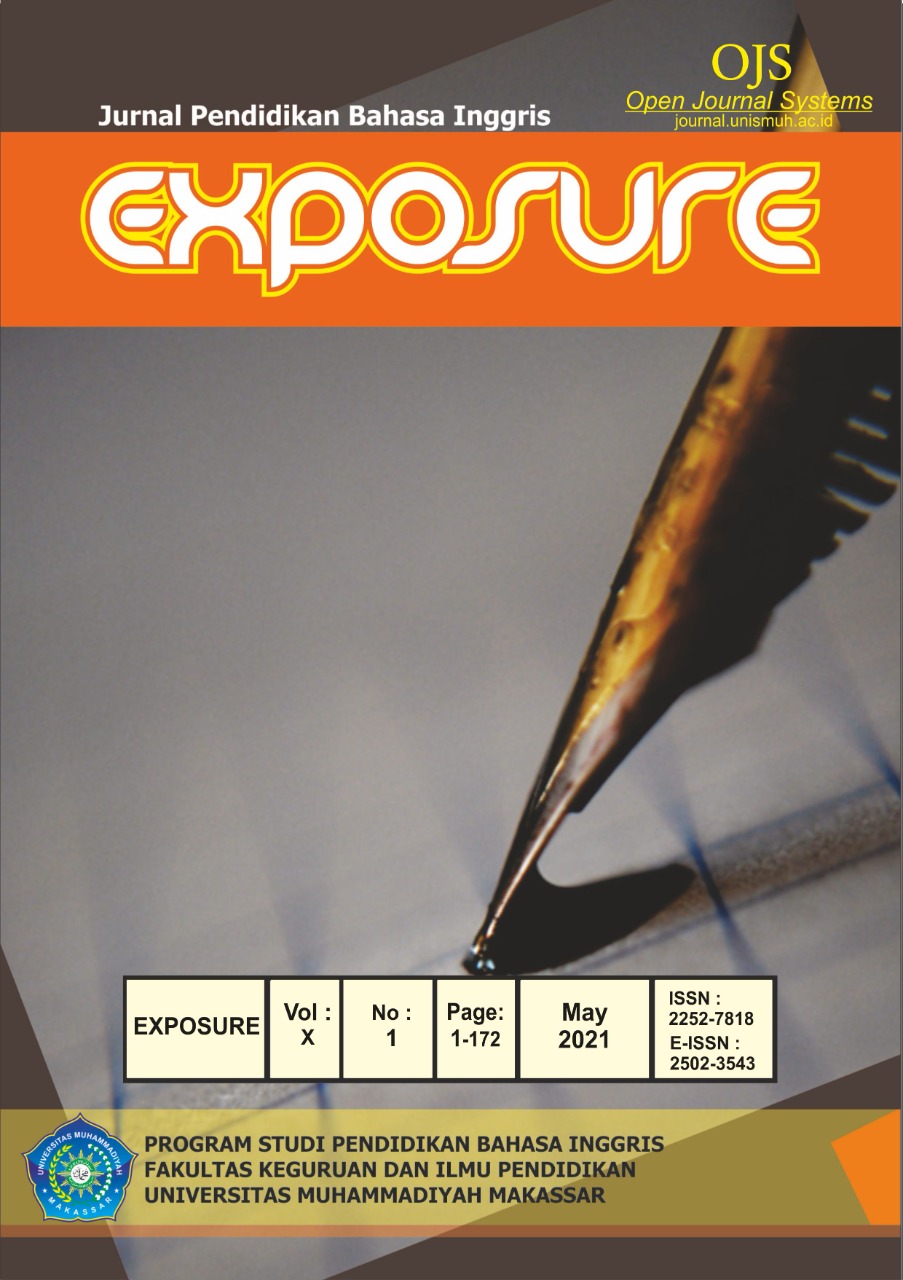LEVEL STUDENTS INTEREST IN LEARNING SPEAKING BY UTILIZING PODCASTS THROUGH INQUIRY STRATEGYAT SMKN 4
DOI:
https://doi.org/10.26618/exposure.v10i1.5174Keywords:
Students Interest, Podcast, Inquiry strategyAbstract
Technology has produced prominent contribution on education in this information age, it is well known as Edu technology. The researcher tries to introduce an alternative media, namely podcasts. Podcast is one of interactive media applied to support learning process in the classroom in developing listening and speaking skills. A descriptive quantitative method was conducted by the researcher in this study. The population was the XI Grade of SMK 4 Sidrap. Due to this semester only consisted one intact class (20 students), the researcher used the cluster sampling method in deciding the research sample. The instruments that were used in collecting the data Liker’s scale questionnaire. The result of the data found was analysed by using SPSS Application. The students stated interested in learning speaking toward podcast. It was proved by the mean score of students’ interests was 55.40 and considered as moderately interested.References
Barber, E. (2007). Fifty ways toimprove your Business Englishusing the internet. Oxford:Summertown Publishing Ltd.
Chan, W. M., Chi, S. W., & Lin, C. Y.(2011).Students’ Perceptions of and Attitudes towards Podcast-BasedLearning– A Comparison of Two
Language Podcast Projects. ElectronicJournal of Foreign Language Teaching,8(1), 312-335.
Jordan, M. (2007). What a podcast is and everything you need to know about podcasting. Technology in Education. Retrieved June 13, 2020 from http://www.americanchronicle.com/articl es/viewArticle.asp?articleID=47099
Peterson, E. (2010). Internet basedresource for developinglistening. SISAL Journal, 1(2),139-154.
Shiamaa, A. E. F. T. (2006). The Effectivenessof Task-Based Instruction Program inDeveloping the English LanguageSpeaking Abilitys of Secondary StageStudents. Ain Sham: Ain ShamUniversity.(Thesis).Retrieved June 11,2020 fromfiles.eric.ed.gov/fulltext/ED523922.pdf
Youthlearn. 2001. An Introduction to an Inquiry-Based Learning. http://www.teachsoup.org/article.downloaded on November 2020.
Downloads
Additional Files
Published
Issue
Section
License
Authors who publish with this journal agree to the following terms:
In order to assure the highest standards for published articles, a peer review policy is applied. In pursue of the compliance with academic standards, all parties involved in the publishing process (the authors, the editors and the editorial board and the reviewers) agree to meet the responsibilities stated below in accordance to the Journal publication ethics and malpractice statement.
Duties of Authors:
- The author(s) warrant that the submitted article is an original work, which has not been previously published, and that they have obtained an agreement from any co-author(s) prior to the manuscript’s submission;
- The author(s) should not submit articles describing essentially the same research to more than one journal;
- The authors(s) make certain that the manuscript meets the terms of the Manuscript Submission Guideline regarding appropriate academic citation and that no copyright infringement occurs;
- The authors(s) should inform the editors about any conflict of interests and report any errors they subsequently, discover in their manuscript.
Duties of Editors and the Editorial Board:
- The editors, together with the editorial board, are responsible for deciding upon the publication or rejection of the submitted manuscripts based only on their originality, significance, and relevance to the domains of the journal;
- The editors evaluate the manuscripts compliance with academic criteria, the domains of the journal and the guidelines;
- The editors must at all times respect the confidentiality of any information pertaining to the submitted manuscripts;
- The editors assign the review of each manuscript to two reviewers chosen according to their domains of expertise. The editors must take into account any conflict of interest reported by the authors and the reviewers.
- The editors must ensure that the comments and recommendations of the reviewers are sent to the author(s) in due time and that the manuscripts are returned to the editors, who take the final decision to publish them or not.
Authors are permitted and encouraged to post online a pre-publication manuscript (but not the Publisher’s final formatted PDF version of the Work) in institutional repositories or on their Websites prior to and during the submission process, as it can lead to productive exchanges, as well as earlier and greater citation of published work (see The Effect of Open Access). Any such posting made before acceptance and publication of the Work shall be updated upon publication to include a reference to the Publisher-assigned DOI (Digital Object Identifier) and a link to the online abstract for the final published Work in the Journal.

